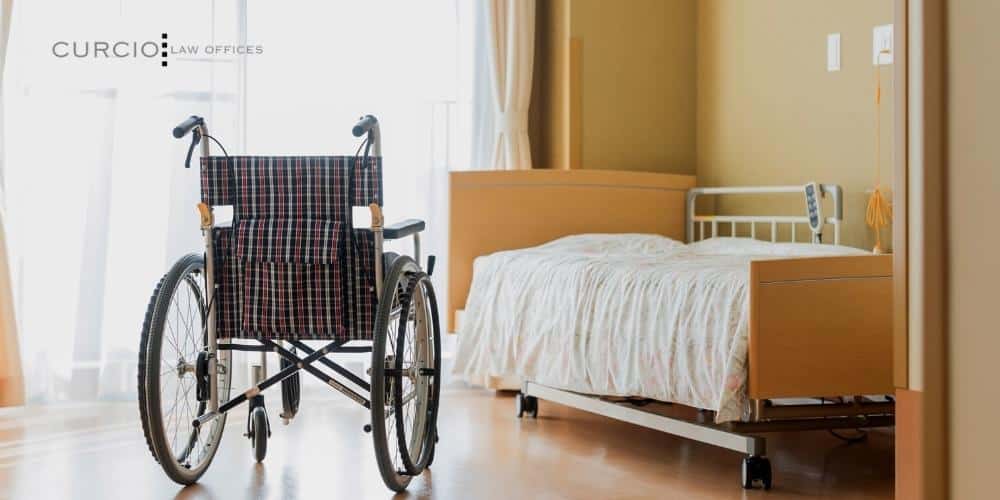Deciding whether or not you should put an elderly family member into a nursing home is one thing. But deciding to remove them – and figuring out how to remove a patient from a nursing home – is another matter. Both situations require you to prioritize your loved one’s needs above all else. Whether you need to remove a loved one from their nursing home due to legal based causes or due to improved care availability, it’s important to seek legal counsel.
Chicago nursing home negligence lawyers at Curcio & Casciato have the skill and experience necessary to protect the legal rights of your elderly loved one if they are facing a nursing home removal or transition. Call 312-321-1111 to schedule a free consultation with our legal team today.
Common Reasons Why Elderly People Are Removed From Nursing Homes
Elderly people leave nursing homes for a variety of reasons. Sometimes it’s the decision of the resident and their family members and sometimes it’s the decision of the nursing home. And sometimes, nursing home abuse and neglect is at play, so the only way to protect the health and wellbeing of a nursing home resident is to remove them from their facility immediately.
Below, our legal team breaks down common reasons why nursing home residents leave their facilities.
Nursing Home Abuse and Neglect
Unfortunately, nursing home abuse and neglect is incredibly common in the United States. The most common reasons why seniors suffer abuse and neglect in a nursing home is due to understaffing and poor training. If there aren’t enough people to provide care for residents, then the patients aren’t going to receive the appropriate care. It’s a similar story with poorly trained staff members. If the nursing home is so understaffed that they’re cutting corners with training just to get people in the doors, then there’s a higher chance that these staff members will provide low quality or negligent care.
Common signs of abuse and neglect in long term care facilities include:
- One or more bedsores, especially ones that are stage 3 or stage 4
- Poor hygiene (noticeable body odor, dirty hair and nails, smelly sheets and clothes, etc.)
- Multiple infections over the course of a few months (UTIs, MRSA infections, respiratory infections, etc.)
- One or more incidents of sepsis and/or septic shock
- Dirty diapers and/or pee pads
- Significant weight loss due to malnutrition
- Drastic change in personality or mood
- Visible bruises on the resident’s body
- One or more falls in the last few months
- One or more incidents of choking on food
- Negative reactions to medication errors
- The resident is being unreasonably restrained with bed rails, lap trays, soft ties, and/or psychoactive medications
- The resident’s condition is generally declining at a rapid pace since receiving nursing home care
If you suspect abuse or neglect is occurring in your loved one’s nursing home, you need to seek legal counsel and report the facility to the Illinois Department of Human Services because chances are, your loved one isn’t the only one suffering. The IDHS and an experienced elder abuse lawyer can investigate the facility and help you get the best care for your elderly loved one.
Removing abused loved ones from nursing facilities is a tough but necessary decision. We can help you protect the health and wellbeing of your loved one while taking care of any legal issues that come with their removal.
Leaving By Choice
Sometimes a nursing home resident just wants to leave because they don’t feel comfortable or welcome in their new facility. Or maybe the senior feels secure enough to live independently with appropriate support. Or maybe the facility just doesn’t have the services necessary to fulfill the resident’s medical care. These are all completely valid reasons to switch to a different community.
If you’re wanting to bring your loved one home, it’s crucial to speak with their doctor first. That way you can figure out what kind of support they will need before they come home. For example, they may need mobility aids, a home care nurse, shower or wall handrails, etc.
Forcing Elderly People to Move
Sometimes, it’s the nursing home’s decision to remove a resident. There are certain circumstances that warrant the forcible removal or transfer of a resident, including:
- The resident is extremely disruptive or abusive to other residents and staff members.
- Nursing home closures due to understaffing or poor funding, for example.
- The nursing home is being forced to remove or transfer residents due to understaffing.
- The resident (or their family member) can no longer pay the nursing facility.
- Proper medical needs cannot be provided for the resident at their current facility.
More rarely, facilities will try to illegally remove their residents. The facility may claim that Medicaid funds have run out or that they don’t have enough nursing home rooms available. If your loved one’s nursing home is making claims like this in order to remove them, you need to speak with a top-notch elder abuse lawyer at Curcio & Casciato. We will help you navigate the situation.
Regardless of the reasoning for a forced removal, nursing homes must provide a discharge notice at least 30 to 60 days in advance. This written notice allows the resident (and their family) to mentally and physically prepare to move to an alternative nursing home.
If you disagree with the facility’s decision to remove or transfer your loved one, you can file an appeal on their behalf. If you do this, the nursing home cannot remove your loved one until the court issues a written decision on the matter. If you are looking to file an appeal, be sure to consult with Chicago nursing home abuse and neglect lawyers at Curcio & Casciato first.
It’s important to remember that residents rights do not change during a forcible removal or transfer. They have the right to be treated with respect during the whole process, and they have the right to decide where they want to live next. Additionally, nursing homes are required to help with aspects of discharge planning, such as:
- Sending referrals to other nursing home facilities that the resident has chosen
- Following up on facility referrals and providing updates to the resident about the follow-ups
- Ensuring that residents have access to transportation when it’s time to move to another facility
- Providing assistance when the resident packs their belongings
- Ensuring that the new long term care facility has the resident’s medical records, insurance cards, identification, etc.

Can a Nursing Home Refuse to Discharge a Patient?
No, a nursing home cannot refuse to discharge a resident due to specific state and federal regulations. The only exception to this rule is if the resident is mentally or physically unable to make their own decisions. For example, an elderly patient with dementia or Alzheimer’s cannot decide to leave a nursing home on their own. Specific family members would likely need to make this decision for them.
The nursing home (or a patient’s physician) can advise against the departure, especially if the resident needs specific medical care and round-the-clock supervision. But ultimately, if the patient has the ability to make their own decisions, the facility cannot stop them from leaving.
What is Relocation Stress Syndrome?
Relocation stress syndrome – also known as transfer trauma – occurs when elderly people experience severe anxiety, confusion, loneliness, and hopelessness during the transition from their home to a nursing home. Elderly people can also experience this syndrome when transitioning from home facility to another.
It’s important to keep this in mind during any sort of living transition. Moving is a huge stressor for anyone of any age. In fact, many medical experts claim that moving is among the top 5 stressors that someone can experience in their lifetime. This stress can greatly affect mental and physical health.
With all that being said, our elderly loved ones are likely already struggling with their mental and physical health. So it’s important to prioritize their health and comfort during this time.
Creating a Plan for Discharge From a Nursing Home
After discussing how to remove a patient from a nursing home with your parent’s physician and/or facility, it’s important to formulate a plan for discharge. Having a set plan in place can help alleviate some stress for the resident and everyone else involved. Here are some things you should consider adding into your discharge plan:
- Packing: Help the resident (or ensure that someone helps the resident) pack up their personal belongings. Figure out where these items need to go. Do they need to go to a new facility or a loved one’s home?
- Preparing the Next Facility: Be sure that the next facility has all important documents ahead of the resident’s arrival.
- Notify Insurance Providers of the transition between nursing homes.
- Provide a New Address to the resident’s friends, family members, and payment companies (if applicable).
- Create a Moving Budget: Moving to anywhere can be expensive. Make sure you budget (or you help your loved one budget) for the upcoming move.
Tips for Removing an Elderly Loved One From a Nursing Home
Moving residents from one facility to another (or from a facility to home) is stressful. There are a lot of medical, legal, and financial considerations to deal with, all of which can cause a lot of stress for the elderly patient. Listed below are a few tips that can prioritize the health, safety, and comfort of the patient during this time.
- Contact a Long Term Care Ombudsman: A nursing home ombudsman is someone who advocates for an elderly person’s rights, health, wellbeing, and comfort. Moving is stressful no matter who you are, and an Illinois ombudsman can help make the transition easier for everyone.
- Keep Track of Medications and Dosages: Moving is very busy, but it’s crucial that no one forgets the patient’s medications and dosages throughout the day. Taking the wrong medication or dose (or missing a medication altogether) can easily worsen physical and mental distress for the patient.
- Make Sure the Resident Eats and Hydrates: It’s common to lose your appetite from the stress of moving. It’s also common to just forget to eat while moving. But, similarly to the medication issue, lack of food and water on a stressful moving day can easily worsen any distress the patient may be feeling. Help them feel more comfortable by encouraging them to eat and hydrate.
- Provide Emotional Support in order to ease symptoms associated with relocation stress syndrome. Ask your elderly loved one how they’re feeling and genuinely listen to their feelings. Ask them what you can do to make the transition easier and less stressful.
- Hire Legal Representation from Curcio & Casciato: It’s common to run into legal issues when moving residents between facilities. Additionally, some facilities may try to violate patient rights during removals or transfers. When this happens, it’s crucial to speak with a Chicago nursing home negligence lawyer.

Call a Chicago Nursing Home Abuse and Neglect Lawyer at Curcio & Casciato Today
If your loved one is suffering from abuse and neglect or if you’re struggling with the legal/financial details of nursing home removal, contact the top-notch legal team at Curcio & Casciato. We want to protect residents and provide families with the legal support they need to keep their parent healthy and happy. Call 312-321-1111 to schedule a free consultation with us today.



